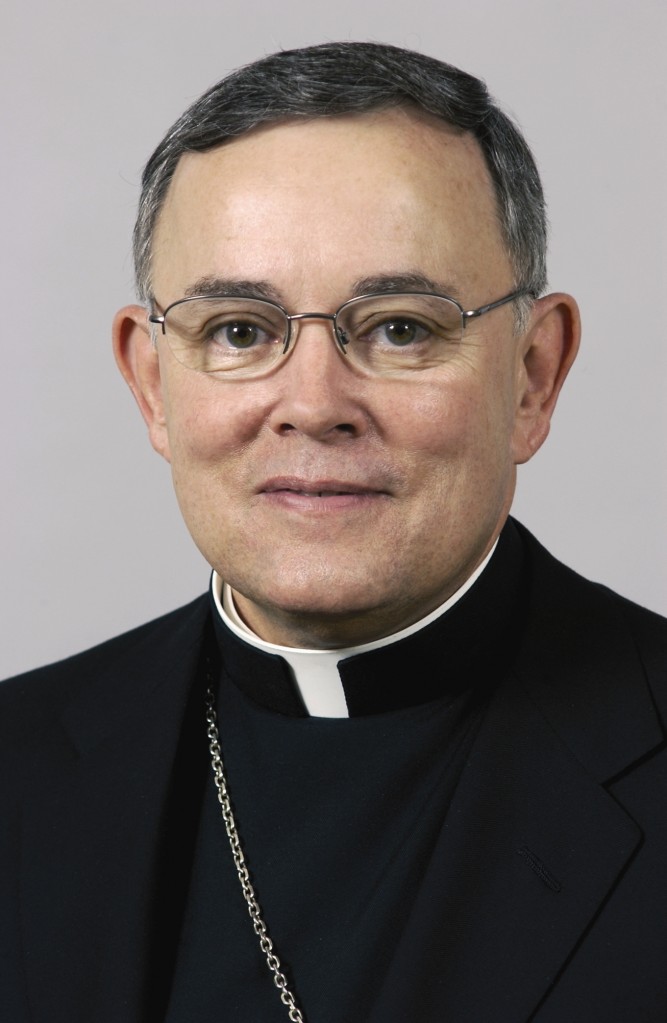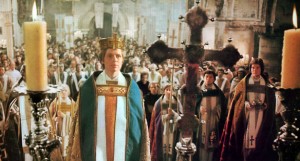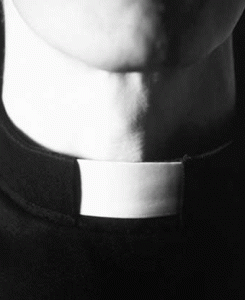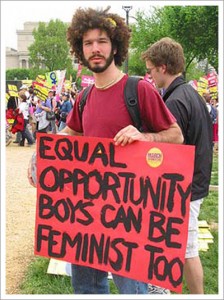Welcome to Philly, Archbishop Chaput!
July 19, 2011 by admin
Filed under Blog, Faith, Fatherhood, manliness, Scriptural Examples, Virtue
Okay, so he’s not here yet (will be installed on Sept 8, 2011), but the faithful in Philadelphia are very excited to welcome him! Archbishop Chaput is an incredible shepherd and has always been wonderful to me on a personal level. I had the privilege of meeting him while in college; while still an anti-Catholic/sola scriptura/ evangelical. I then was able to meet him several more times, post reversion, working with FOCUS (The Fellowship Of Catholic University Students) and then on a more personal note when I was Director of Catholic Campus Ministry at the Air Force Academy; he was always wonderful about coming to the Academy to speak to the Catholic cadets. His leadership is second to none, but his humility is that of Christ. He is an incredible man and we are blessed to have him as our new archbishop.
Archbishop Chaput is an incredible shepherd and has always been wonderful to me on a personal level. I had the privilege of meeting him while in college; while still an anti-Catholic/sola scriptura/ evangelical. I then was able to meet him several more times, post reversion, working with FOCUS (The Fellowship Of Catholic University Students) and then on a more personal note when I was Director of Catholic Campus Ministry at the Air Force Academy; he was always wonderful about coming to the Academy to speak to the Catholic cadets. His leadership is second to none, but his humility is that of Christ. He is an incredible man and we are blessed to have him as our new archbishop.
(Our journeys are similar… from Kansas, to Colorado, to Pennsylvania. And, I hear he’s a Steelers fan!)
Here’s an interview with him from Catholic News Agency…
Q: You must have some interesting thoughts about being appointed to the See where the Declaration of Independence was written, the “City of Brotherly Love” where the first American male saint — St. John Neumann – was bishop.
A: I don’t think it’s real for me yet. I could give you half a dozen reasons why other men might be more qualified, and why I’m the implausible choice. But I do believe in the Holy Father’s wisdom, so I accept that the See of Philadelphia is where God wants me to be. My life as a priest – first as a Capuchin Franciscan and now as a bishop – is shaped by a commitment to obedience; obedience to God as Father. The voice of the Pope is the voice of the Father for me.
I’m going to miss the Archdiocese of Denver very, very much. Colorado has been home to me for 14 years. The priests and people there have been unfailingly generous. They really are my family, and a part of my heart will always be in Denver.
But I look forward to embracing the new family that God is giving to me, the family that is the Church of Philadelphia. Over the years I have had many friends, both priests and laypeople, with roots in Philadelphia, and I’ve always been struck by their faith and their goodness. So it’s a great privilege to be sent there. The fact that Philadelphia is where of the Declaration of Independence was signed and the center of so much of our country’s early history, means a great deal to me. I think the United States has been blessed by God in unique ways. Because of that blessing, America has a duty to be a blessing for the world and for all people. I also think that words like “the City of Brotherly Love” should be more than just a good tourist slogan. Philadelphia is one of this country’s truly great cities, and I want to be part of renewing and deepening the best in this community.
I’ve been praying to St. John Neumann a lot since getting the news. I want to love the priests and people of Philadelphia with the same zeal he brought to his ministry. At least I can guarantee that no one will work harder, or try harder, than I will.
Q: What are the main challenges you might face in your pastoral mission?
A: The biggest challenge, not just in Philadelphia but everywhere, is to preach the Gospel in a way that captures the imagination of God’s people. The biggest task that lies before us is evangelization. We need to have confidence in the Gospel. We have to live it faithfully, and to live it without compromise and with great joy.
The Church in Philadelphia is at an important point in her life. It’s not a time to be embarrassed about what we believe. In fact, it becomes even more crucial to preach the Gospel – both within the Church and outside the Church.
Q: Regarding the grand jury report and allegations involving the clergy, what needs to be done in restoring the mission and the morale of the priesthood? What are your ideas about the priesthood, and also the relationship with the laity?
 A: I haven’t read the grand jury report yet, and it will be awhile before I fully understand the issues. I need to hear from the people involved in these matters and to learn the facts before I comment.
A: I haven’t read the grand jury report yet, and it will be awhile before I fully understand the issues. I need to hear from the people involved in these matters and to learn the facts before I comment.
I do know that priests’ morale across the country has been seriously wounded by the abuse scandal. I’m sure the priests of Philadelphia carry this burden in their own unique way. But we know that Jesus, when he chooses men to be priests, chooses them with a brother’s love, and I want to be a sign of that love to my brothers. We have to deal with scandal in an honest, thorough, confident way. We can do that, even when it’s very painful, because we know that Christ rose from the dead. “Jesus Christ is risen” — these aren’t just powdered words; they’re a statement of fact. That should give us confidence that what happens in the Church, even when it seems death-dealing, can be turned into a moment of resurrection.
Q: What catches your attention most about the local Church in Philadelphia?
A: I have a lot to learn about Philadelphia, but I’m eager to get started. I did live in western Pennsylvania for 10 years – first as a seminarian, then as a seminary professor, and eventually as a part of the administration of the Capuchin Province of St. Augustine based in Pittsburgh. My time in the state was delightful. I look back on it with great joy. The men and women of Pennsylvania that I’ve met are wonderful people; good, generous and creative. I look forward to being a part of their lives.
Q: You’re a Native American and quite proud of your heritage. Can you talk a little bit about your background, and what that means to you?
A: I’m Native American on my mother’s side. I’m a member of the Prairie Band Potawatomi tribe. Our reservation is in northeastern Kansas.
Being Indian was probably the entry point for my becoming a bishop. One never knows why one becomes a bishop, but my first assignment was the Diocese of Rapid City, South Dakota. I suspect I was sent there was because of my engagement with the Native American Catholic community in the United States. The Holy Father was looking for a way to reach out in special love to the native people. So I see my episcopacy, in some ways, as born from that part of who I am.
The Native American people – the original inhabitants of this land – are a very diverse group with many, many gifts. I’ve always hoped that through my service as a bishop, those gifts can be recognized by the Church all the more, and that the Church can better meet the needs of Native people.
I was blessed to be the first Native American archbishop, and my people were honored by that.
Q: You’re also a Franciscan Capuchin. St. Francis had a pretty radical approach to the Gospel, and the Capuchins were known as reformers within the Franciscan community. How does this shape how you see the Church’s task, and your role as a leader?
A: Francis was radical in the root meaning of the word “radical,” which means to go “to the root” of the matter. He wanted the friars to live the Gospel clearly, without compromise. The word he used was, “without gloss.” It was a custom, in the Middle Ages, to develop commentaries on the Gospel, and sometimes those commentaries would explain away the Christian’s responsibility to live the Gospel without compromise in every moment of our life. Francis rejected any kind of effort to diminish the demands of the Gospel.
Of course, I have to live that discipline personally in my own life. That’s the most important part of my Capuchin identity. But then I have to preach the Gospel in the same kind of way, in a way that’s clear, that’s always fresh, and always without compromise.
Before anything else, we’re called to be Catholics. That should be the defining part of who we are. Whether we’re Indians or Germans or Irish; whether we’re Democrats or Republicans, we are Catholic first. Everything else is secondary. Francis called his brothers not only to live that Catholic identity personally, but to preach that unvarnished Gospel with clarity. And I hope that my service as a bishop always enables me to do that.
Q: You’ve talked about this issue of Catholic identity frequently. Why is that so important to you? Is there something about American culture that encourages people to compartmentalize their faith from the rest of their lives?
A: Many of the dominant themes of our time work contrary to the Gospel. All of us who are Catholics are very much influenced by our culture and by our society’s criticism of the Gospel. Because of these pressures, Catholics are often tempted to be embarrassed by their faith, and to make decisions that are compromised by our desire to somehow please the world, while satisfying God. We often can’t do both. We always need to choose to please God first.
We need the support of the Church, the help of our brothers and sisters in faith, to live the Gospel in this difficult environment. That’s why I’ve spent so much time in these last years, as a bishop, writing and speaking about this. I want the Church to have confidence in the Gospel and Christians to support one another, regardless of the opposition to the Gospel in our culture.
We owe it to our country and the age we live in, to be faithful Catholics. If we’re good Catholics first, then we’re good citizens, and if we’re good citizens, then we’ll be a force of transformation for justice in the world. If we don’t live as faithful Catholics, we betray the Gospel. We forfeit the opportunity God gives us to make a significant difference for the evangelization of culture.
Q: Many Catholics now serve in Congress, in state houses, in governors’ mansions — we even find Catholics as a majority on the Supreme Court. But we often don’t see the content of Christian social teaching reflected in society. Does this relate to that issue of Catholic identity?
A: There’s an obvious temptation, in political life, to compromise Christian virtues and values because of the pressures of the society around us. But I wouldn’t first point to governors, or congressional representatives, or Supreme Court justices. I’d point to ourselves. If our political leaders lack conviction about their faith, it’s because the members of the Church lack conviction about their faith. Political leaders are no different from the rest of us. So if we point fingers at them, we’re also pointing fingers at ourselves, and at the broader Church community.
So the Gospel should be preached, first of all, in the Church. Naturally, we need to preach it to political leaders as well. But they’re not alone – not by a long shot — in their tepidity and compromises of the Gospel. If Catholics in their homes and parishes understand that, they’ll realize that a serious conversion needs to take place in all our lives, and not just in the lives of politicians.
Q: If this applies to every member of the Church, how do you think it applies to bishops? What do you think is the role of a bishop in American society?
A: A bishop, before he’s a bishop, is a Christian. And before he’s ordained, he’s baptized. So I think that anything that we say about Christians, we have to say about bishops, too. And bishops, because they’re raised up to be a sign of the presence of Christ in the Church, need to live the Gospel more clearly and more authentically, without compromise, than anyone else.
We can’t preach to others what we don’t embrace ourselves. And because we sometimes don’t practice these things ourselves, sometimes we’re embarrassed to preach these things to others. This is also why those who are called to preach the Gospel might sometimes be silent.
So I think that bishops always have to be engaged in the process of their own personal conversion – prior to calling others to conversion. At the same time, we can’t let our sins and our failures cripple us; otherwise the Apostles themselves would have stayed silent. We have to practice what we preach. But even if we don’t, we always have to preach the Gospel. And if we preach it to others, conscious that we need to be converted ourselves, then things really will begin to change.
Q: From your perspective as a bishop, where are we as a Church, and as a nation, on the issue of abortion?
A: I think that our country, in some special sense, is going to be judged by God on that issue. If we’re not able to protect the most vulnerable members of our society, then we aren’t living up to the public commitment we have as a nation to protect the life, liberty, and happiness of every individual. The unborn child certainly shares with us our human dignity, and has a right to those protections. That’s why I believe this remains one of the fundamental issues of our time. We can’t be a people of justice if we don’t protect the life of the unborn child.
This is, of course, just one of the pressing issues of our time. Also vitally important is the question of the meaning of marriage. Family life is the foundation stone of all community. It’s the first community that we’re born into. The health of our families will lead to the stability or weakening of our society.
The Church’s efforts today, to protect the traditional meaning of marriage, are on behalf of stable family life, for the sake of children. Marriage is a relationship of a man and a woman, in a stable and faithful way, for the sake of children. The most important thing for our development into mature adults is that we know that our fathers love our mothers and our mothers love our fathers. If we don’t know that, then a certain kind of instability enters our lives. Anything we do, as a country, to undermine that meaning of marriage, creates a danger – a clear danger – to the long-term health of our country.
Q: The fact that civil laws favoring so-called gay “marriage” have been approved in several places, in the last two years, has led some people to say that the Church, and especially the bishops, have “lost the argument” in the American culture. How do you think individual Catholics should approach this issue in their communities? And what is the right role of the institutional church and the bishops?
A: We only lose when we stop working and struggling for what we believe to be true. In a very general sense, the battle was “lost” the day after Golgotha. Except the disciples didn’t get the memo.
I don’t think we’ve lost the marriage issue at all. Even framing the question that way shapes the answer in a wrong direction, because the language of a debate conditions how we think. If we concede the language, we concede the issue. I do think we’ve been allowing ourselves to lose the marriage debate for years, rooted in our confusion about individual and community rights, and our fear of being portrayed as “against” other people. Catholic teaching on sexuality and marriage is for human dignity; it is for human happiness and the virtuous development of family and society. It is “against” only those behaviors that undermine those goals. When people try to frame Catholic belief as an intrinsic hostility for individual persons or groups, they are not being honest.
Cohabitation today without marriage is quite common, with children being born outside the context of married love, and many people are confused about what marriage really means. Generally, people think “marriage” means a loving relationship between two people that has a sexual component. But that’s not what marriage means. It means a specific kind of loving relationship, for the sake of children. And the more we’re confused about that, the more damage we do to ourselves. So we need to have confidence in our faith and keep fighting this fight with a spirit of serenity. The Gospel is true, and the Church is right about the purpose of human sexuality, whether our critics like the message or not. So much is at stake –not just the moral teaching of the Church, but the health of our communities and our country. If we love our country, that means we fight for the things that protect our country and make it strong.
Q: Four years ago you wrote a book on Catholic political and social engagement, “Render Unto Caesar.” If you had to write that book today, would it have a different accent? In other words, what issues look most important to you today for Catholic political involvement in the United States, and in general, Catholic involvement in the public square?
A: When I wrote that book, four years ago, I was responding to a request from a friend – a young husband and father — who had run for state office, but found it troubling because of the pressure in party politics to embrace issues contrary to Catholic belief. I wanted to engage Catholics in a reflection on their responsibility for our country, and how politics can never be separated from faith even though “separation of Church and state,” properly understood, is a principle that’s worked well in our country. My point is that separation of Church and state was never intended to mean that we separate our faith from our social, economic and political life.
I have a high regard for the book’s publisher, and we’ve talked about doing an updated edition of “Render Unto Caesar.” Since my appointment to Philadelphia, I’ve had a certain kind of enthusiasm for a new version. So, give me some time, and you never know. Maybe I’ll have some additional thoughts on faith and public in the 21st century.
“Womanpriests”, “Pope Joan”… and a side of PC
Lately, I’ve come across several stories, websites, conversations, etc. about ‘womanpriests’. [Some of the websites  claim to be in communion with the Roman Catholic Church. They aren’t. No matter their claims, they aren’t.] One story is about a movie that’s out, exclusively in Europe right now, about the legend of a female Pope that lived during the 9th century. This claim is unsubstantiated and completely fabricated. One story, which I saw posted on Facebook, spoke of a ‘womanpriest’ from the St. Louis area who is pregnant. “The first female Roman Catholic priest to be pregnant in history.” What is the obsession with women being priests?!?!
claim to be in communion with the Roman Catholic Church. They aren’t. No matter their claims, they aren’t.] One story is about a movie that’s out, exclusively in Europe right now, about the legend of a female Pope that lived during the 9th century. This claim is unsubstantiated and completely fabricated. One story, which I saw posted on Facebook, spoke of a ‘womanpriest’ from the St. Louis area who is pregnant. “The first female Roman Catholic priest to be pregnant in history.” What is the obsession with women being priests?!?!
 I think the obsession is the false understanding of freedom in our culture, mixed with a heavy dose of moral relativism, topped with a false sense of equality… served with a side of PC. In our culture, fairness has been turned into a “if they get one, I deserve one too” system. Society completely distorts the understanding of gender, gender roles, equality, fairness and the intention of God in regards to gender and sexuality. The world has turned everything into a competition and some people believe that in order to be considered ‘equal’, they must have the same opportunities as everyone else. Think about that – it doesn’t make sense.
I think the obsession is the false understanding of freedom in our culture, mixed with a heavy dose of moral relativism, topped with a false sense of equality… served with a side of PC. In our culture, fairness has been turned into a “if they get one, I deserve one too” system. Society completely distorts the understanding of gender, gender roles, equality, fairness and the intention of God in regards to gender and sexuality. The world has turned everything into a competition and some people believe that in order to be considered ‘equal’, they must have the same opportunities as everyone else. Think about that – it doesn’t make sense.
Why is it, that as soon as a man is allowed (created) to do something, some women automatically insist that they should be allowed to do the same? The insistance includes many such things that are outside the scope of a woman’s role. See, when a man is ordained a priest in the Catholic Church, he becomes the spouse of Mother Church. Plain and simple. No apologies here… politically correct or not.
Being politically correct is not Catholic. It’s not charitable, it’s not what Jesus did, it’s not what we should do. Being politically correct asks us to waterdown our faith, to become “tolerant” of everything that’s going on around us – whether morally acceptable or not. No thanks.
As always, I’m not diggin’ on women. I’m not trying to deify men. What I’m saying is that we were each created for something great, as a man or as a woman. Those things can be (and most likely are) different.
Stand up for the dignity of each person. Respect life. Respect what God created you for. Stand up for Truth. Stand up against the notion of tolerance. Ruffle feathers, if that’s what it takes. Christ wasn’t a fairweather prophet… He didn’t take the position of “acceptance”… See, what Christ did (which is what we are supposed to model our lives after) is that He loved sinners too much to allow them to stay where they were.
TrueMan up!
Vocational Discernment
 Something that I’ve been discussing lately at the Air Force Academy among some of the faithful Catholic cadets is the topic of vocational discernment. For those who may not know, a vocation is a calling. (From the Latin, vocare.) The world would like to suggest that our calling is to something like an occupation; something we are drawn to and enjoy. Vocations, however, are much deeper than this. Vocations are about the call from God that will bring us fulfillment and happiness in life, to prepare us for life eternal with God in Heaven. The discernment part is how someone goes about listening to the call and applying that call in their life.
Something that I’ve been discussing lately at the Air Force Academy among some of the faithful Catholic cadets is the topic of vocational discernment. For those who may not know, a vocation is a calling. (From the Latin, vocare.) The world would like to suggest that our calling is to something like an occupation; something we are drawn to and enjoy. Vocations, however, are much deeper than this. Vocations are about the call from God that will bring us fulfillment and happiness in life, to prepare us for life eternal with God in Heaven. The discernment part is how someone goes about listening to the call and applying that call in their life.
Many of the young men I have been discussing vocations with lately seem to know that they are called to the priesthood – however, they are all in different places with their decision making process. One young man is denying his call. Another is preparing to leave to enter seminary in a few months. Another wants badly to leave and enter a religious order, yet, doesn’t have the support from important family members. They are all journeying towards Christ. In this journey, they will find their way if they keep their eyes on Christ.
If you are currently discerning your vocation – married, religious or consecrated single life -, I recommend you take the following steps.
- Have an active, daily Sacramental and prayerful life.
- Seek a qualified spiritual director and meet with him regularly.
- Read good quality, orthodox, Catholic spiritual books.
- Talk to lots of people – priests, religious, seminarians, married men, married fathers and single men. Gather that information and prudently process it. (Ask lots of questions.)
- Spend at least 2 minutes per day gazing at a crucifix contemplating Christ’s example of love.
 A word to family and friends of men discerning their vocation. I urge you to support them, whether you agree or not with their decisions. If a young man chooses the priesthood, via a call from God, don’t think that it’s an abrogation of life, or life as you know it. The priesthood is an incredible calling and must be respected and supported. Many believe that the priesthood is suppressing reality and suppressing sexuality and suppressing the desire to have a family. This is simply not true. Please, refrain from being a stumbling block in a man’s discernment. Support him, love him, answer his questions, attempt to guide him. In the end, however, it’s the man’s decision, not yours.
A word to family and friends of men discerning their vocation. I urge you to support them, whether you agree or not with their decisions. If a young man chooses the priesthood, via a call from God, don’t think that it’s an abrogation of life, or life as you know it. The priesthood is an incredible calling and must be respected and supported. Many believe that the priesthood is suppressing reality and suppressing sexuality and suppressing the desire to have a family. This is simply not true. Please, refrain from being a stumbling block in a man’s discernment. Support him, love him, answer his questions, attempt to guide him. In the end, however, it’s the man’s decision, not yours.
Here’s a short clip called “Fishers of Men” from the Vocations Office in NYC. Click HERE if you can’t see the video below.
TrueMan up!
RMCMC 2010 – One Day Away
 The 2010 Rocky Mountain Catholic Men’s Conference is only one day away. Saturday, March 20, 2010 proves to be an epic event and I encourage any local (Colorado) men to make it a priority. There are plenty of seats available and you can pay at the door. The event takes place at the Pikes Peak Center in downtown Colorado Springs… merely an hour’s drive from Denver from the north or Pueblo from the south. Here’s why an event like this is important.
The 2010 Rocky Mountain Catholic Men’s Conference is only one day away. Saturday, March 20, 2010 proves to be an epic event and I encourage any local (Colorado) men to make it a priority. There are plenty of seats available and you can pay at the door. The event takes place at the Pikes Peak Center in downtown Colorado Springs… merely an hour’s drive from Denver from the north or Pueblo from the south. Here’s why an event like this is important.
- As men, we thrive off brotherhood. Brotherhood may be considered, simply, when men spend time together, preferably doing manly things. Imagine what boys growing up together do – then make it relevant to adulthood and things that actually matter… that’s what this conference (and hopefully all men’s conferences around the country) are about. Together, as men of faith, we encourage one another to grow in holiness, Sacramental behavior, daily prayer, and hopefully, to be better men.
- Men need encouragement. Think of this like an over-sized team huddle, when your team is in a vital spot and really needs to score a touchdown, or that gigantic defensive stop to win the game. The quarterback or defensive leader should be trying to pump his team up so they pull off the incredible play. The encouragement from the speakers, vendors, priests and bishops and the other men in attendance can be just the thing that most of us need to get our act together and win in the game of life.
- Men need to continue to grow in holiness. No matter where a man is in his faith journey, he can be a better man. Events like a men’s conference show us the path to holiness, especially if we’re open to what the Holy Spirit is doing in our lives.
I encourage all of us to think about at least one man that we know that needs an invitation to something like this, and then make the invitation. If you’re a man who’s attending a men’s conference, just extend the invitation. If you’re a woman who knows of a man who needs to attend an event like this, it would be best to have another man extend the invitation at your request. An invitation isn’t pressure to go, it’s a simple way of showing encouragement and extending a friendly hand. Don’t be weak in your invitation and don’t be a power-monger either. Be genuine and see what happens… it can’t hurt to ask. Maybe you don’t live in Colorado and can’t get to the Rocky Mountain Catholic Men’s Conference, that’s okay. There’s an event like this somewhere near you, and if there isn’t, I want to know! (I’ll work to get something there!) A men’s conference may be the thing that encourages a man to change his life for Christ.
To see more info, click HERE to go to the conference website.
Man up!
In Response – Not the Point
 I recently received a comment on one of my posts, “That Blue One’s the Boy One”. The commentor, as you can read below in red, misses the point.
I recently received a comment on one of my posts, “That Blue One’s the Boy One”. The commentor, as you can read below in red, misses the point.
The color examples don’t make any sense. Attributing color to gender is arbitrary. It’s not an instinct. It’s learned. Before the 20th century, most babies were dressed in white because it could withstand hot washes. In the 1920’s in the US, pink was for boys and blue was for girls. Pink was considered a watered down shade of red, think blood and blue was considered dainty because it was the color of the sky and water. The French dressed girls in pink and the Germans dressed boys in pink. It’s meaningless. Think dresses are for girls? Not in this country. Most boys wore dresses in the late 1800’s because fabric was scarce and they grew out of pants too quickly. As for your “men and women are different” arguments, the scientific research has shown that there are more within-group differences than between-group differences for men and women aside from a few physiological differences. The reason that there is a difference is because society has created different rules for different genders. From looking around your website, I guarantee what I am writing won’t make a difference and you probably won’t give it a second thought, but it goes against everything that we know about our society. This site seems to be a giant amalgamation of stereotypical and baseless opinions. It is well-designed though and the layout is phenomenal. I hope that some healthier examples of masculinity, fatherhood and mentoring make their way to your site in the future.
Allow me to respond to Jerrod. First off, thanks for the comment. Secondly, you’re missing the point in the first half of your comment. It wasn’t about the color, which I clearly stated in my original post. You bring up some other points that need clarification.
- The “men and women argument” isn’t my argument. I’m merely stating what others (namely, John Paul the Great; one of the greatest philosophers and peacemakers in human history) have already worked out extensively. To say that there are “more within-group differences than between-group differences” is quite simply, false. Your scientific research is flawed. If you’d like to email me personally, I’m happy to take a look at what you are using as your source(s).
- What you wrote is very important to me. What you wrote is, in part, why I have this website. I’m interested in bringing to light the truths of manhood so that our society can return to a properly functioning society. As of now, in our post-modern society, we do not function properly as a whole. This is mainly because males fail to live up to TrueManhood. I’m working to change that. You say that my website “goes against everything we know about our society.” You’re correct, I’m working to fight the culture we live in. Sin rules our world, and in order for society to thrive, we must fight our tendency toward sin. To say “what we know about our society” implies that what our society does/thinks is correct. What we think is correct, is not. Our society needs conversion of heart to the source of life – Jesus Christ.
- As for the site being a “giant amalgamation of stereotypes and baseless opinions”, I disagree. My articles are based in Catholic truth, the fullness of truth. That’s a giant topic, so I don’t guess we can get into it here. I’m fighting the stereotypes of what is expected of males in our society – just read any of the articles I write about commercials we see. I’m guessing you probably haven’t really read many of my articles, or maybe that you don’t understand them. My apologies. And yes, while my articles are opinion, they are not baseless. My opinions are in line with the Church (many bishops and priests support my website) and are rooted in the understanding of virtue as a way of life. If you’re interested in reading more about virtue, type VIRTUE in the search box and get to reading – there’s lots there. Specifically, you can check out “TrueManhood’s Guide to Virtue”.
- I appreciate the comments about the layout and design. I work hard to keep the sight going. (And, I’m always working on new stuff, and want more comments of what everyone is hoping for!)
- Finally Jerrod, from your last sentence, I’d like to know what you think is a “healthier example of masculinity, fatherhood and mentoring…” Thanks.
Man up!
The Priesthood isn't Weird
I think that sometimes people (both Catholic and non-Catholic alike) see the priesthood as something “weird” – a life of not only celibacy but loneliness and separation. I think it’s also seen as weird because it’s different (and radical) from what a so-called normal life is. It’s quite the opposite. Guess what… priests are men; men who heard a call from our Lord and followed it. They want to serve our Lord. His will, not theirs. Being in my line of work, I’ve met many many priests. Overall, I’d say that most of them are just ordinary men. They like sports, good food, drinking a beer or two and hanging out.
If you’ve never seen this video, please check it out. It is a shortened version of the United States Conference of Catholic Bishops DVD called “Fishers of Men”. It’s a cool video…
[youtube=http://www.youtube.com/watch?v=vDOk1biKqkE]
Man up!




